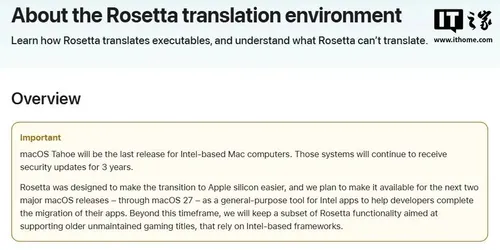For those unfamiliar, Rosetta acts like a translator. It allows Apple’s ARM-based Macs to open and run apps originally written for Intel processors. It’s clever, invisible, and has been essential for keeping older software alive while developers rebuilt their apps for the new architecture.
Once macOS 27 arrives, Rosetta will only survive in a limited form — mainly to keep a few older Intel-only games working.
What developers should keep in mind

Apple says Rosetta can still translate most Intel apps, including those that rely on Just-In-Time (JIT) compilers. However, some things are off the table:
- Kernel extensions
- Virtual machines that emulate x86_64 processors
It supports AVX and AVX2 instructions, but not AVX512. Developers who need those should first check for hardware support using the command sysctlbyname with the flag hw.optional.avx512f.
Mixing Intel and ARM64 code inside the same process is not allowed. Rosetta translates the entire process, including anything loaded later at runtime. Developers can see whether their app is running through Rosetta by calling sysctlbyname with the flag sysctl.proc_translated.
And for regular users? You can still enable Rosetta manually in Finder. Just right-click an app, choose “Get Info,” and check the box to run it with Rosetta if it needs older plug-ins.
Key Points
- Rosetta’s final version under macOS 27
- Intel Mac support officially ends
- ARM64-only macOS future
- Developer adaptation required
- Legacy gaming compatibility retained temporarily
